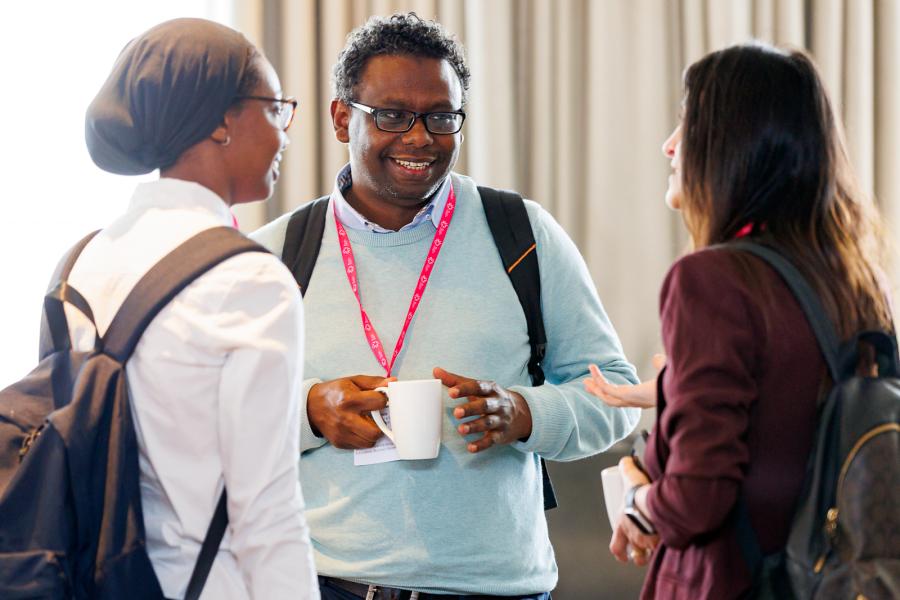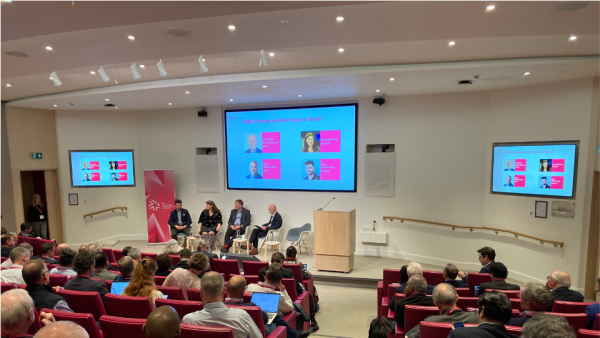
On Thursday, 30th May 2024 at the IET London, UKTIN hosted the inaugural UK Telecoms Innovation Ecosystem Conference to provide a unique opportunity for peers to:
- Hear from and network with senior industry and academic leaders responsible for telecom innovation & growth;
- Find out about the latest innovation ecosystem developments facilitated through UKTIN;
- Get involved in shaping the future priorities;
- Engage and network with colleagues covering a wide range of concerns from R&D to applications.
Joe Butler, Chief Technology Officer, Digital Catapult welcomed attendees and explained the agenda for the event, noting the variety of representatives from academia, the supply and demand sides of the ecosystem and the significance of exploring core areas of the UKTIN programmes through breakouts.
He emphasised: “Your feedback and experiences are extremely important to making sure that we stay current and on track as we move forward.”
A View from the Industry on Telecom Opportunities and Challenges
Gabriela Styf Sjöman, MD, Research and Networks Strategy, BT discussed the emerging technologies laying the foundation for societal growth, and said that “digital connectivity is becoming more important than ever”.
Sjöman highlighted the new digital services on the rise: electrification; mass production; transportation and new media and connectivity. However, new digital services demand new network capabilities. “It is important to inspire but also create a sense of urgency. This industry is struggling. Any industry that is not healthy will not attract innovation,” she said.
Sjöman emphasised the importance of “enabling coordination” because that will enable societal growth. The UK is fourth in the world for innovation, she explained, but the value lies in doing something with that, which is where the country falls behind.
She concluded: “We have to think beyond the valuable chain of connectivity… you have to make a product. We need a healthy ecosystem that addresses supply chains beyond research, one that addresses the demand of digital connectivity.”
Transitioning into Deployment: Emerging Fibre Technologies for Future Optical Networks
David Richardson, Partner Researcher, Microsoft gave a fascinating insight into his work on optical networks. He began by discussing the history of fibre technologies, first developed in the UK in the 1960s. He explained that, having enabled a “great technology” in the 1980s, fibre has fundamental limits and experts have accepted since 2010 that “there isn’t going to be radical improvements” in the technology’s latency.
However, he continued, “We are still at the R&D stage”. While the UK’s use of fibre is “quite impressive”, the technology can be better exploited. “We need to evoke new concepts to allow that to happen,” he said.
Richardson introduced Lumensity, a spin-out from the University of Southampton that was acquired by Microsoft in 2022: the company is a leader in next-generation hollow core fibre solutions, enabling fast, reliable and secure networking for global, enterprise and large-scale organisations. “Our journey started in 2017, operating in stealth mode and came out after about three years. We were ultimately acquired by Microsoft, which means we now have the resources to scale the technology. It has been very fast-paced since then,” he explained.
Sustained government funding was critical, Richardson emphasised, adding, “We have been working with fantastic facilities at Southampton and have worked in an environment where spinning out companies is quite normal. That experience has been beneficial. It is an exciting time in fibre optics.”
Update on UKTIN’s Performance and the Key Issues Confronting the Sector
Ian Smith, the new Head of UKTIN, thanked the speakers for their “insightful” and “fascinating” presentations. “This morning’s speakers really do demonstrate the scale of community that UKTIN convenes and the incredibly exciting work happening across the UK,” he said.
Smith, formerly a member of the UKTIN agri-tech working group said he was “delighted” to join UKTIN. He explained that UKTIN convenes the various subsystems in telecoms, supporting the development and amplification of a ‘sectoral’ voice for UK telecoms that can be used to provide insights to government and recommendations for future policy ideas: “It’s fair to say that UKTIN is another beast entirely from what has come before: something larger, more substantive and a far broader church with significantly extended remit.”
He said: “We’re supporting spinouts, start-ups, scale-ups and SMEs - who are arguably the driving force behind the UK economy - to identify new markets, new opportunities, new propositions and ultimately, investment so they can flourish and feed the ecosystem. Over 200 small businesses are registered on our Innovation Platform and attendees of our tailored telecoms support programme have gone on to secure projects, and funding and have been able to hire staff off the back of roadmaps and plans developed with our trainers. The impact for those individuals is significant, but the knock-on impact for our sector and the UK could be immense and will unfold for months and years to come.”
Smith concluded by highlighting that UKTIN is here to “support” and “advocate” for the telecoms sector. The better the UKTIN team understands and appreciates the industry’s strengths, weaknesses, opportunities and threats, the better able we are to provide that sectoral ‘voice’ to government, adjacent sectors and international audiences, he stated.
The day continued with breakout sessions delving into four key areas: future capability, commercialisation, adoption and talent, skills and diversity. Attendees had an opportunity to discuss these areas and think about how, together, UKTIN members can make a difference.
Follow UKTIN on LinkedIn for further updates.









